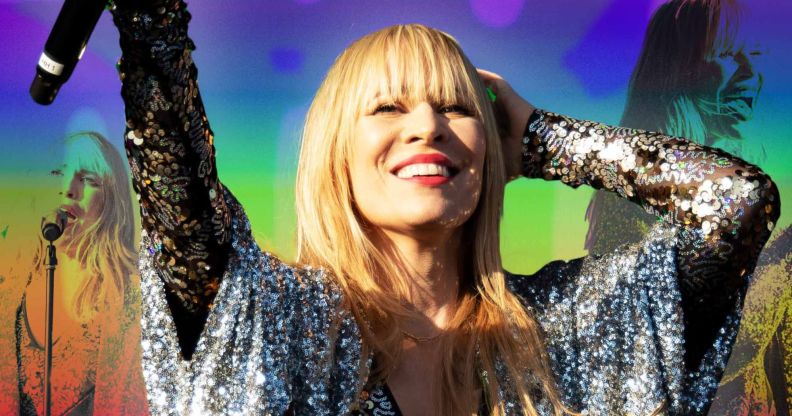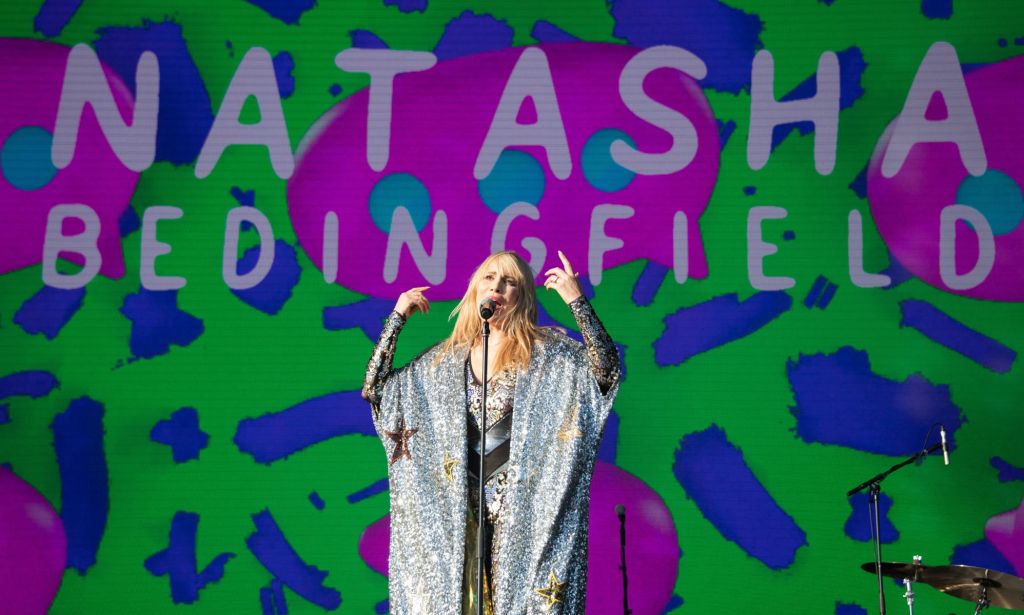Natasha Bedingfield on breaking taboos, being ‘fabulous’, and how queer people changed her life

Natasha Bedingfield shares how queer fans inspire her to push herself out of her comfort zone, and how LGBTQ+ people are changing the world. (Getty/Captured by Corinne)
“These Words” singer Natasha Bedingfield is chilling on a sofa backstage at Mighty Hoopla, the UK’s biggest festival dedicated purely to pop music.
The fact it’s a queer festival through and through is unspoken, though Bedingfield seems to know. The word “Mother” is emblazoned in white across her scarlet t-shirt.
When she takes to the mainstage later on that evening, she’ll perform a string of her biggest hits, though there are a handful that she knows those in the audience will go particularly feral for.
“When I sing ‘Unwritten’ in an LGBTQ+ crowd, I always feel like people really know what it’s about,” she says. “You get it. You get what I’m talking about.”
As the song goes: “Live your life with arms wide open / today is where your book begins / The rest is still unwritten.” It’s an unofficial coming out song, so it’s little wonder that it’s been a queer favourite since its 2004 release.
Alongside “Unwritten”, her 2006 single “Wild Horses” is another song she credits as establishing her connection with the LGBTQ+ community. “That song, people have come out to their parents after listening to [it],” she reveals.
British-born Natasha Bedingfield, now 41, first found fame with her debut record “Single” nearly 20 years ago, and her star ascended quickly. While her brother Daniel had made his name several years before her with his single “Gotta Get Thru This”, Natasha soon eclipsed him.
With a UK number one single, a Grammy nomination, two Brit Award nominations and her debut album Unwritten selling more than one million copies, she established herself as one of the noughties’ most notable newcomers.
While she says her performance of “Single” on Top of the Pops was the moment that changed her life, she remembers being caught off guard by how famous she became.
She recalls going through an airport, only to be stopped by security guards when she put her luggage through the screener. “They motion you over very seriously, and you’re like, they found something in my bag! And they’re like, ‘Are you … you?'”
When she arrived at her destination, it hit home even harder. “I remember that moment [of] going to another country where I’d never been before, and they already knew my name.”
With a number one single and album under her belt, it was clear that she had universal appeal, though her label wanted her to narrow her target audience down. “I always wanted to be very inclusive,” she says, but her label was keen for her to pick a demographic.
They tried to make her the “girl next door”, but she fought to inject “colour” and “brightness” into her music and aesthetic. She relates the experience to her “Unwritten” lyrics – she’s “breaking tradition” and “outside the lines”.
The gays love a struggle-to-success narrative, so perhaps that’s why the community has always been fond of her.
She’s keen to point out that this isn’t a one-sided relationship. Her queer fans have taught her a lot: how to embrace her body, how to be herself, how to truly enjoy a rave (at gay raves, people aren’t interested in talking, she says. “It really is like the best place to actually dance.”)
“As a performer, I’m very good at makeup, being fabulous, but like, really being myself, authentic, stepping into who I am – that’s a lesson I’m always learning from the gay community, and it’s powerful,” she explains.
Everyone at Mighty Hoopla is being themselves, that’s for sure. Revellers turn up in drag or in elaborate, feathered and sequinned costumes. Others just flaunt their bare chests (and bare asses, for that matter). For Natasha, witnessing the queer community dressing as they like is inspiring.
She shares an anecdote about recently being offered the chance to either give a “serious” talk to scientists, or attend a fashion show. After some deliberation, she chose the latter.
“I’m really glad I did because it broke my own taboos. I wore something that was see-through, that showed my body, and my boobs and everything was jiggling around,” she shares, smiling ear-to-ear. “I was like, ‘woah, I’ve not done that before’. It was interesting to break my own boundaries.”

It’s a tough time right now to be a queer person, with a tide of anti-LGBTQ+ legislation in the US and politicians on in both of the UK’s main parties seemingly uninterested in taking our issues to heart. Dancing to the songs of our musical icons like Natasha Bedingfield is just one way of releasing the fear and anxiety that many of us are feeling right now.
“I think we’re all hoping that the world is going to change. And I think the gay community, just by being themselves, you’re changing the world, just by being proud of who you are,” Natasha says.
There’s a lot that still needs changing and a lot of work to do, but in the meantime, queer people deserve a day or two just to unwind, have a drink, and sing along to “Unwritten”.
“I want my shows to be a safe place,” she says, “where you can really let go and release your inhibitions.”

